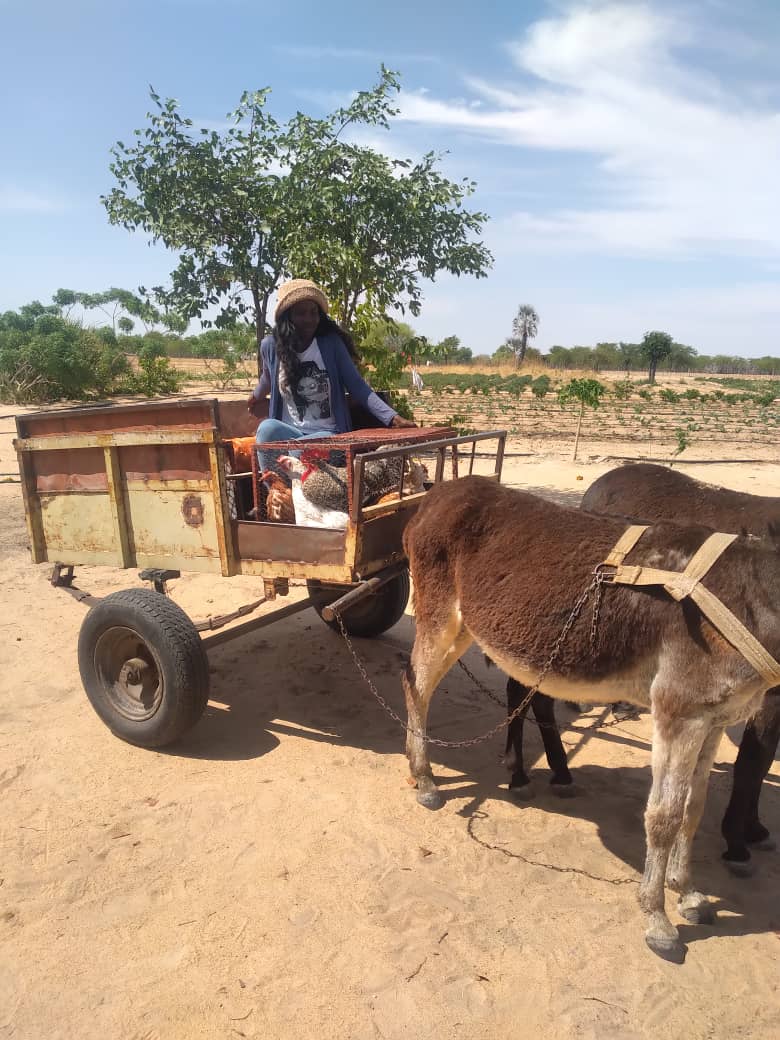Maria Shikalepo takes one last look at her orders of poultry products before carefully loading them onto her trusted transport, and neatly putting each box down to avoid breakage. This is something she does daily before setting off to sell her products.
She has to put the boxes down softly for they are eggs and can break easily. And her trusted transport mode is a donkey cart, which makes for a bumpy ride, literally. But Shikalepo remains unfazed by it all. If anything, it inspires her to keep going.
She farms primarily with Bochveld, Kuskus, Australorp, Orpington and Sussex chicken, which she said has been producing wonders for her agribusiness.
Shikalepo is an integrated farmer from Okathimbi village near Outapi in the Omusati region. Here, she runs a poultry business that trades in almost anything on two legs which has feathers and a beak. While her prime undertaking is chicken layers and broilers, she also houses some ducks, pigeons and even guinea fowls.
In addition to this, she carries out fish farming to complement other farming modes.
To keep her business afloat, Shikalepo has mastered the art of keeping her agribusiness costs low. This she does by engaging low-cost initiatives such as the donkey cart for transport, and even trading her precious home-grown Omahangu for some greens as chicken feed.
It has not been an easy ride for Shikalepo’s business, and neither are the rides that she takes on the donkey cart, navigating the thick loamy soil of the area in search of customers to sell her products. But she has managed to persevere, and is now reaping the results of her hard toiling.
The business was founded in 2018 with only 50 broiler chicks, which she purchased off Facebook. It was a gamble ordering and paying for products off social media, but luck was on her side, and she got her ordered products in good time. This marked the birth of Mbale Yange, Shikalepo’s poultry business.
The arrival of the chicks proved a challenge for the untrained Shikalepo, who had to run around to prepare some form of infrastructure for the birds.
“I was not prepared. It was a shock when the chicks arrived as I had no idea what type of structures and infrastructure would be decent for them. So, I opted to keep them in one small thatched hut, which later proved to have been an ideal structure for them,” she explained.
Shikalepo said her biggest inspiration was drawn from her father, now deceased, who helped shape an agricultural mind into her. He raised his children to appreciate hard work and always contribute to their own wellbeing by working with their hands.
Taking a leaf from her father’s book, and being forced by circumstances to put food on the table, the unemployed Shikalepo took on poultry farming. And like a duck to water, she excelled at it too – even adding ducks to her farming. She has all types – Muscovey and runner ducks.
One of her biggest challenges has been the high costs of chicken feed, which has led many farmers to give up poultry farming for other forms of farming enterprises. Shikalepo is, however, unfazed by it and has decided to tackle it head-on. Her solution – a garden of greens.
“I realised that gardens and poultry work well together. But you must do your planning well; it is not easy to start both at the same time. I experimented with cabbage, then went on to spinach and mealies. Chicken love the greens, and they have been feeding on them well,” she said.
Shikalepo also found that broilers are difficult to keep due to their opportunistic feeding habits, which in turn means more money out of the business for feed. As such, she was forced to drastically cut back on the number of broilers to save costs.
She advises the youth and those who are unemployed to venture into poultry farming as start-up costs are low and the demand for such products are usually high, exceeding the supply available.
“Starting a poultry business is not easy, neither is it difficult. Your greatest enemy when you venture into this will be your mind, which you must keep healthy so that you remain focussed and on course,” she urged.
As Shikalepo prepares to mount the donkey cart on her return trip home, determination and sheer perseverance are clearly manifested in every metre she covers with her beloved business transport.
Waving goodbye to her newly-found customers, she rushes off to her next stop – a village some five kilometres away where the same process will repeat itself.



